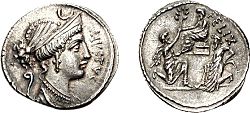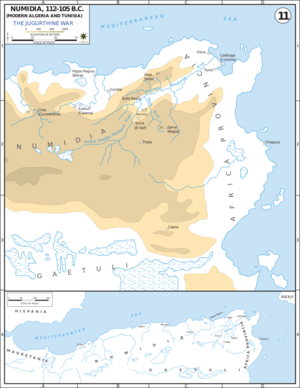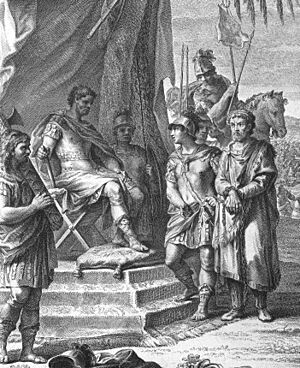Jugurthine War facts for kids
Quick facts for kids Jugurthine War |
|||||||||
|---|---|---|---|---|---|---|---|---|---|
 Coin commemorating Sulla's capture of Jugurtha |
|||||||||
|
|||||||||
| Belligerents | |||||||||
| Roman Republic Mauretania | Numidia | ||||||||
| Commanders and leaders | |||||||||
| Lucius Calpurnius Bestia Spurius Postumius Albinus Aulus Postumius Albinus Q. Metellus Numidicus Gaius Marius Lucius Cornelius Sulla |
Jugurtha of Numidia Bomilcar Bocchus of Mauretania |
||||||||
The Jugurthine War (Latin: Bellum Iugurthinum) was a big fight between the Roman Republic and King Jugurtha of Numidia. Numidia was a kingdom in North Africa, where modern Algeria is today. This war lasted from 112 BC to 106 BC.
Jugurtha was the nephew and adopted son of Micipsa, the king of Numidia. After Micipsa died, Jugurtha became king. He did this by getting rid of his rivals through fighting and using gifts to influence people. Numidia had been a loyal friend of Rome for a long time. Because of Jugurtha's actions, Rome felt they had to step in. This war was an important step in Rome taking control of Northern Africa. However, Numidia did not become a Roman province until much later, in 46 BC.
Contents
Jugurtha and Numidia: How the War Started
Numidia was a kingdom in North Africa. It was next to Carthage, which used to be a big enemy of Rome. King Masinissa of Numidia was a strong ally of Rome. He died in 149 BC. His son, Micipsa, became king and ruled until 118 BC.
When King Micipsa died, he had three possible heirs. These were his two sons, Adherbal and Hiempsal I, and his nephew, Jugurtha. Jugurtha had fought alongside Roman soldiers before. He learned a lot about Roman ways and military tactics. Micipsa was worried that Jugurtha would try to take over the kingdom from his own sons. So, he adopted Jugurtha. He decided that the kingdom should be shared by his two sons and Jugurtha.
After King Micipsa's death, the three rulers argued. They agreed to divide the kingdom into three parts. But they could not agree on how to split it. Jugurtha then started a war against the other two. Hiempsal was killed by Jugurtha's agents. Adherbal was defeated and ran away to Rome. He asked the Roman Senate for help.
The Senate was supposed to help settle Micipsa's will. But Jugurtha used gifts to influence Roman officials. The Roman Senate sent a group, led by a former Roman leader named Lucius Opimius. Their job was to divide Numidia fairly. This started in 116 BC. However, Jugurtha influenced the Roman officials. He got the better, richer western half of Numidia. Adherbal received the eastern part. Adherbal had no power against this unfair decision and accepted it.
Soon after, in 113 BC, Jugurtha attacked his cousin again. He defeated Adherbal and forced him to hide in Cirta, Adherbal's capital city. Jugurtha wanted to conquer all of Numidia and rule it himself.
Rome saw this as a threat to peace in the region. They decided to support Adherbal. With Roman help, Adherbal held out for several months. Many Roman businessmen living in Africa also helped him. From inside Cirta, Adherbal asked Rome for help again. The Senate sent a message to Jugurtha. It told him to stop the war and respect Adherbal's right to his kingdom.
Jugurtha ignored this demand. So, the Senate sent another group. This time, it was led by Marcus Scaurus, a respected Roman leader. He was sent to threaten Jugurtha into giving up. King Jugurtha pretended to want to talk. He dragged out the discussions with Scaurus and Adherbal. This made Cirta run out of food and hope for rescue. When Scaurus left without getting Jugurtha to agree, Adherbal surrendered. Jugurtha quickly had him killed. He also killed all the Romans who had helped defend Cirta.
The deaths of Roman citizens made the common people in Rome very angry. The Senate was pressured by a popular Roman leader named Gaius Memmius. Finally, Rome declared war on Jugurtha in 111 BC. They joined Adherbal's side, even though they were reluctant.

Roman Commanders and Challenges
Bestia's Campaign
Lucius Calpurnius Bestia, a Roman leader, was put in charge of the Roman army in Africa. He was joined by Scaurus and other experienced officers. Bocchus I, the king of Mauretania, offered to become Rome's ally. Bocchus was Jugurtha's father-in-law. His change of loyalty worried Jugurtha.
Jugurtha sent a message to the Roman leader, offering to surrender. The Roman senators thought he was no longer a threat. They gave him a very favorable peace treaty. Numidia was given back to Jugurtha. In return, he gave gifts to the Senate, paid a small fine, and gave up his war elephants. (He later bought the elephants back cheaply from corrupt officers.)
This treaty was so good for Jugurtha that it made the people in Rome angry again. A Roman leader named Memmius demanded an investigation. Jugurtha was called to Rome to speak about the treaty. He was promised safe travel. But instead of testifying, he influenced two Roman leaders. They stopped him from speaking. During the outrage, Jugurtha's cousin, Massiva, who had fled to Rome, tried to claim the Numidian throne. Jugurtha had him killed. The Senate was at first willing to accept more gifts to let him escape punishment. But his disrespectful actions and the public's anger forced them to kick him out of the city. The peace treaty was canceled, and the Roman armies were sent back to Numidia.
Spurius and Aulus Postumius
The Roman leader Spurius Postumius Albinus took command of the Roman army in Africa in 110 BC. But he failed to act strongly. This was because he was not very good at his job, his army was not disciplined, and some said Jugurtha had influenced him. Later that year, Albinus went back to Italy. He left his brother, Aulus Postumius Albinus, in charge.
Aulus was more active but not better than his brother. He decided to make a bold move. In the middle of winter, he marched to attack the town of Suthul. This town held the Numidian treasury. But Suthul was well-defended and strongly built. Aulus could not capture it. He did not want to retreat without fighting the enemy. So, he let Jugurtha trick him into going into the empty Sahara desert. Jugurtha, who had reportedly influenced Roman officers, caught the Romans by surprise. Half of the Roman army was killed. The survivors were forced to walk under a yoke. This was a shameful sign of surrender.
The defeated Postumius signed a treaty. It named Jugurtha king of all Numidia forever. It also brought back the peace agreed with Bestia and Scaurus. However, when the Senate heard about this surrender, they refused to accept the terms. They decided to continue the war.
Metellus Takes Charge
After Postumius's defeat, the Senate finally got serious. They appointed Quintus Metellus as commander in Africa. Metellus was known for being honest and brave. He showed good judgment by choosing officers based on their skills, not just their rank. Both Gaius Marius and Publius Rutilius Rufus noted Metellus's focus on skill in his officers.
When Metellus arrived in Africa in 109 BC, his first job was to retrain the army. He brought back strict military discipline. In the spring, he led his new army into Numidia. Jugurtha was worried and started talking about peace. Metellus tried to convince Jugurtha's messengers to capture Jugurtha and give him to the Romans. Jugurtha was clever and guessed Metellus's plan. He stopped the talks and moved his army south, behind the Numidian mountains.
Metellus followed him. He crossed the mountains into the desert and moved towards the Muthul River. Jugurtha had split his army into two groups. One group was south of the mountain. The second group was closer to the river.
Metellus sent one force directly south to the river. The rest of his army, led by Metellus and Marius, marched southwest. They wanted to move Jugurtha from his position. Jugurtha, however, showed great leadership. He sent his soldiers to hold the mountain passes. This cut off the Romans' escape route. Meanwhile, his light cavalry attacked Metellus's soldiers across the plain. The Romans had heavy cavalry and could not respond well. The Numidian light cavalry horses were used to the rough land. They could attack and then quickly escape.
Meanwhile, the other Roman force reached the river but was attacked by Jugurtha's southern group. So, the two Roman armies could not help each other. But even though Metellus's army was trapped in the desert, the Romans still won both fights. The Roman forces defeated Jugurtha's soldiers. Metellus had won the Battle of the Muthul, but Jugurtha escaped. It was not a final victory.
New peace talks failed. Metellus refused Jugurtha's offers and demanded that the king surrender himself. To fight the Romans better, Jugurtha sent away most of his less skilled soldiers. He kept only his best infantry and light cavalry. He planned to fight using hit-and-run tactics. Metellus kept moving forward, capturing town after town. But he could not capture Jugurtha. He tried to make Jugurtha fight a big battle by attacking the Numidian city of Zama. But the king refused to fight a big battle and kept using his surprise attacks.
In 108 BC, Metellus found Jugurtha's army. He caught up with the Numidians and dealt a serious defeat to the king. Jugurtha, with his family and treasures, fled to the desert fortress of Thala. It was very hard to reach, requiring a three-day march through the desert without water. Metellus gave his army water bags and followed. He attacked the fortress, which fell after forty days. However, Jugurtha managed to escape from the burning fortress. This undid all of Metellus's hard work.
At this point, Jugurtha went to the court of his father-in-law, King Bocchus I of Mauretania. Bocchus had said he was a friend of the Romans before. But now he welcomed Jugurtha. Without officially declaring war on Rome, Bocchus moved his troops into Numidia. He went as far as Cirta, the capital. Metellus, who was staying in the area for the winter, began talking with Bocchus. He wanted Bocchus to hand over Jugurtha.
Before an agreement could be reached, Metellus was removed from his command. The Roman citizens' assembly replaced him with his assistant, Gaius Marius. A disagreement in the Roman camp between Metellus and Marius led to this change. Metellus did not like Marius's known desire for power in Roman politics. He refused for days to let Marius sail to Rome to run for a high office. Eventually, Metellus let Marius return to Rome. Marius was elected to a high office in 107 BC. Metellus did not know that Marius still wanted to command the troops in Numidia. Numidia was not an area usually given to a Roman leader by the Senate. However, a group of Roman politicians who supported the common people passed a law. This law gave the command against Jugurtha to Marius in 107 BC. This was important because the assembly took over the Senate's power in this matter, and the Senate did not fight it.
Metellus was very angry about all these events. He decided to make Marius's command much harder. He refused to let his soldiers serve under Marius. Metellus sent them back to Italy. They joined the army of another Roman leader, Lucius Cassius Longinus. Metellus did this only to stop them from being used in Numidia. (Lucius was about to march north to fight a Germanic invasion.)
Marius's Victory
When Gaius Marius arrived in Numidia as a Roman leader in 107 BC, he immediately stopped talking about peace and restarted the war. Marius marched west, raiding the Numidian countryside. He captured small Numidian towns and forts. He tried to make Jugurtha fight a planned battle, but the Numidian king refused. Marius's plan was similar to Metellus's and did not give better results. He continued to take over Numidian towns and made several strong positions.
At the end of 107 BC, Marius made a dangerous march through the desert to Capsa in the far south. After the town surrendered, he executed all survivors. Next, he moved far to the west. He captured a fort near the Muluccha river where Jugurtha had moved much of his treasure. Meanwhile, Jugurtha's loyal followers had recaptured Cirta. By marching so far west, Marius brought the Roman army very close to King Bocchus's lands. This finally made Bocchus join the war on Jugurtha's side.
In the deserts west of Serif, Marius was surprised by a huge army of Numidians and Mauretanians. They were led by the two enemy kings. For once, Marius was not ready for a fight. In the chaos, all he could do was form defensive circles. The attack was pushed by Gaetulian and Mauretanian cavalry. For a time, Marius and his main force were surrounded on a hill. Marius's assistant, Lucius Cornelius Sulla, and his men were defending themselves on another hill nearby. However, the Romans managed to hold off the enemy until evening. The Africans left, sure they would finish the job the next morning. But the Romans surprised the Africans' poorly guarded camp at dawn the next morning. They completely defeated the African army.
The Romans then marched east to take Cirta again and stay there for the winter. The African kings bothered the march east with light cavalry. But Sulla, whom Marius had put in charge of the rearguard and cavalry, pushed them back. The combined African army then tried to finish off Marius. But when Sulla returned from his pursuit, the Romans completely defeated both Jugurtha's and Bocchus's armies. Marius had won the Second Battle of Cirta. His army could now safely spend the winter at Cirta.
It was clear that Rome could not defeat Jugurtha's hit-and-run tactics through war alone. So, over the winter, Marius started talking with Bocchus again. Bocchus had joined the Second Battle of Cirta, but he had not yet officially declared war on Rome. Finally, Marius made a deal with Bocchus. Sulla, who was friendly with people in Bocchus's court, would go into Bocchus's camp. He would receive Jugurtha as a hostage to ensure peace. Even though there was a chance Bocchus might betray him, Sulla agreed.
Siding with their Roman allies, Jugurtha's remaining followers were then betrayed and killed by the Mauretanians. King Jugurtha was handed over in chains to Sulla by Bocchus. After this, Bocchus took control of the western part of Jugurtha's kingdom. He was made a "friend of the Roman people," which meant he was an ally of Rome. Jugurtha was thrown into an underground prison in Rome. He was later killed after being paraded in Marius's victory parade in 104 BC.
What We Learned from the War
The Jugurthine War clearly showed problems with political corruption in Rome at that time. Jugurtha was able to have his betrayals and defiance ignored simply by giving gifts to Roman military and government officials. This showed a decline in Rome's moral values. Romans now often sought power for themselves, even if it hurt the state.
This was also seen in Marius's rise to power. He ignored some Roman traditions to get ahead. These events were also watched by Marius's assistant, Lucius Cornelius Sulla. Sulla later became a rival to Marius. This rivalry led to the first of the big civil wars in the Late Republican Period. According to the historian Plutarch, their rivalry began because Sulla played a key role in capturing Jugurtha. Sulla even wore a ring showing the capture, even though Marius was given credit for the victory.
The Roman historian Sallust wrote a book, Bellum Jugurthinum, about the Jugurthine War. He wrote about how Roman ethics were declining. He believed this war was one of the first events that led to the end of the Roman Republic. Sallust's book, along with Plutarch's biographies of Sulla and Marius, are important historical records about the war.
|
 | Mary Eliza Mahoney |
 | Susie King Taylor |
 | Ida Gray |
 | Eliza Ann Grier |


